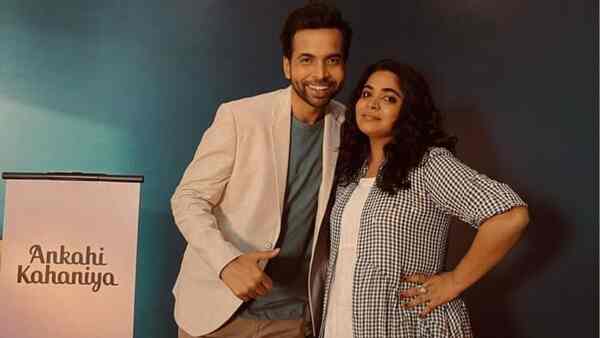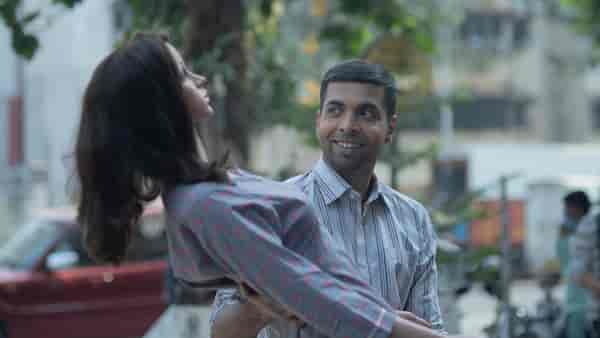Exclusive! Ashwiny Iyer Tiwari on Abhishek Banerjee: I explored his talent to show his different side
In the Netflix anthology Ankahi Kahaniya, directed by Ashwiny Iyer Tiwari, Abhishek Banerjee is seen romancing a mannequin.

Last Updated: 04.22 PM, Sep 17, 2021
Netflix's yet another anthology Ankahi Kahaniya is finally streaming. The film features one of the stories by Ashwiny Iyer Tiwari, who has made her OTT debut with it. In her directorial with a unique concept, the actor roped in Abhishek Banerjee to play the lead role. The actor is seen as a man dealing with loneliness in the big city of Mumbai and finds solace in a mannequin. When OTTplay caught up with Ashwiny and Abhishek for interaction before the release of Ankahi Kahaniya, they spoke at length about their rare concept.
Moreover, the director-actor duo also revealed their favourite inanimate objects they have a sentimental value for and, found it difficult to part with them.
Excerpts...
Ashwiny: So we were given the topic of love by Ronnie Screwvala, Ashi Dua and Netflix. We had to write this idea during the pandemic. I wanted to explore and challenge myself more, in terms of what kind of stories do I want to say and what to communicate. Piyush Gupta, who's one of the co-writers of this particular story had this idea and we felt it right. It speaks about loneliness, companionship and also has a lot of layers, in terms of direction. Challenging myself as a director, was more important and, also to tell different stories with whatever I wanted to do. So on paper, it looked quite difficult, but we scored it with the help of Nitesh Tiwari, Piyush Gupta and Shreyas Jain. It was challenging. I was looking at it from three different perspectives - what the audience will feel about the connection between an object and my protagonist Pradeep, played by Abhishek; what I would like to communicate to the audience; and at the same time, to come back and talk in the form of a visual story. I'm glad I took it up and Ronnie, Ashi and Netflix believed my interpretation on paper and were okay to go ahead with my vision.
Ashwiny: I've always liked to cast actors who have not done something similar before. So if you see any of my films, you would know that I've always tried to cast differently. With Abhishek, I have liked his performances in his various films, and it was nice to see him in a different kind of role. As a director, I could also explore his talent and show the world a different side of him. I always do believe that a good actor is like a chameleon who can get into any role.

Abhishek: I was pleasantly surprised that I am being considered for this part and that I'm going to work with Ashwiny ma'am. I knew that it's going to be something out of my comfort zone. I am not trained for romance as I've been saying that's an emotion, which doesn't come easily to me. I've not done plays, short films or any kind of work that have such characters and where I could take references. I didn't want to take references from movies or books that I have watched and read. I wanted to try and feel something unique, which is what I think the character and the script demand. It was a difficult process, to begin with, but also very exciting because I knew that the only way I could probably do justice to this role is by being honest with myself. If I'm honest with myself, then probably I'll be honest with Pari, which is a non-living thing. The most challenging part was to imagine how I feel or to anticipate her emotions, her mood. I hope that came out well.
Abhishek: For an actor, I think it becomes important to have your backstories right. When you have to tell the story in life 40 to 45 minutes, you don't have time to settle in. Probably, you need to pick up from the midpoint of life without showing the past. The process behind the scenes and the world in which your character lives become very important too. It's important to get that world because you have limited time to adjust to that world, to that mood and its rhythm; then probably start flowing in with your performance. It's an interesting space for actors to explore and learn.
Ashwiny: I do feel that every story has its rhythm. There is nothing difficult or easy about any of the mediums which we undertake, be it a web series, short film, or whether it's an original or a long feature. If we are given the task of making a short film, we need to abide by its rules and give it our best. But nothing changes in terms of direction because you are still telling a story that has a beginning, middle and end. You still have to work with your actors, your partners in production design, cinematographers, stylists and other crew members to get everything together. It isn't that the timeline changes but the story is written for a short film, so that's where the difference is. It's important to know what you're writing for.

Ashwiny: I had one weird one. It is my mom's saree. My mom had made a blanket out of it, and I used it for the longest time. It had become so bad that one day, my mom threw it away without telling me. I was very upset with her. I didn't speak to her. For her, it was just a blanket, which had worn out and a torn saree, which she made for me. She tried consoling me saying that she would make another one but I wanted the same one only.
I am also attached to my steel plate at my grandmother's house. There was one for each one of us and I used to get this one plate which is difficult to find now. Recently, I got it back from my grandmother. I only eat on that steel plate.
Abhishek: I have so many t-shirts. I still have one favourite which is worn out, but I still wear it and go out. My wife would ask why am I wearing an old t-shirt and I have no answer. I have a set of clothes and shoes like that, which I wear again and again. Then, of course, I have this one coffee mug, which I always liked. If I don't get coffee in that mug, I would wash the mug myself and have coffee in it. I think we all have attachments like these with objects because we spend a lot of time with them in our lives. It's very natural, I feel.
Ashwiny: I think it's a great concept of anthologies because it's almost like writing a book with lots of short stories in it. We have never questioned short stories in terms of a book, so then why do we question anthology? It's so great to see different kinds of filmmakers and writers coming together and telling different kinds of stories. It just brings everyone together. For some reason, when you put all the stories together, you just feel they are one. It also allows you to tell different kinds of stories, which you may not be able to in long formats. Some stories are for short films snd I'm so glad that we can explore this whole idea of short films in the form of an anthology.
Abroad, there has been a short film festival but we started it only recently. I'm glad that there are people, promoting the idea of short films because you get to see so many different kinds of stories. The same story, which not necessarily needs to be told in a long format or a two-hour film, can be told in a short duration with the same goals you want to achieve.
Abhishek: Yes. I think OTT has given actors, a platform to showcase that we don't necessarily need to be stereotyped or put in a box. Once your performance or project becomes a success, that genre becomes an objective in your CV as an actor. People say, 'okay, he's a great comic actor or he's a great negative actor'. That's been the case for many years. Thankfully now, we have the opportunity to explore, experiment and not fit in anywhere. That's how I always saw acting. I don't want to fit into a particular genre, be it comedy, drama or romance. All of those emotions are something which we don't know whether we have in us until and unless we start performing them. Actors are trained to perform different emotions at different stages, spaces and in stories. The whole thing is about navarasa, which you learn to perform and use in different characters and situations. I am glad that we have a medium where we can continuously keep experimenting without the fear of being judged.

 Premium
Premium